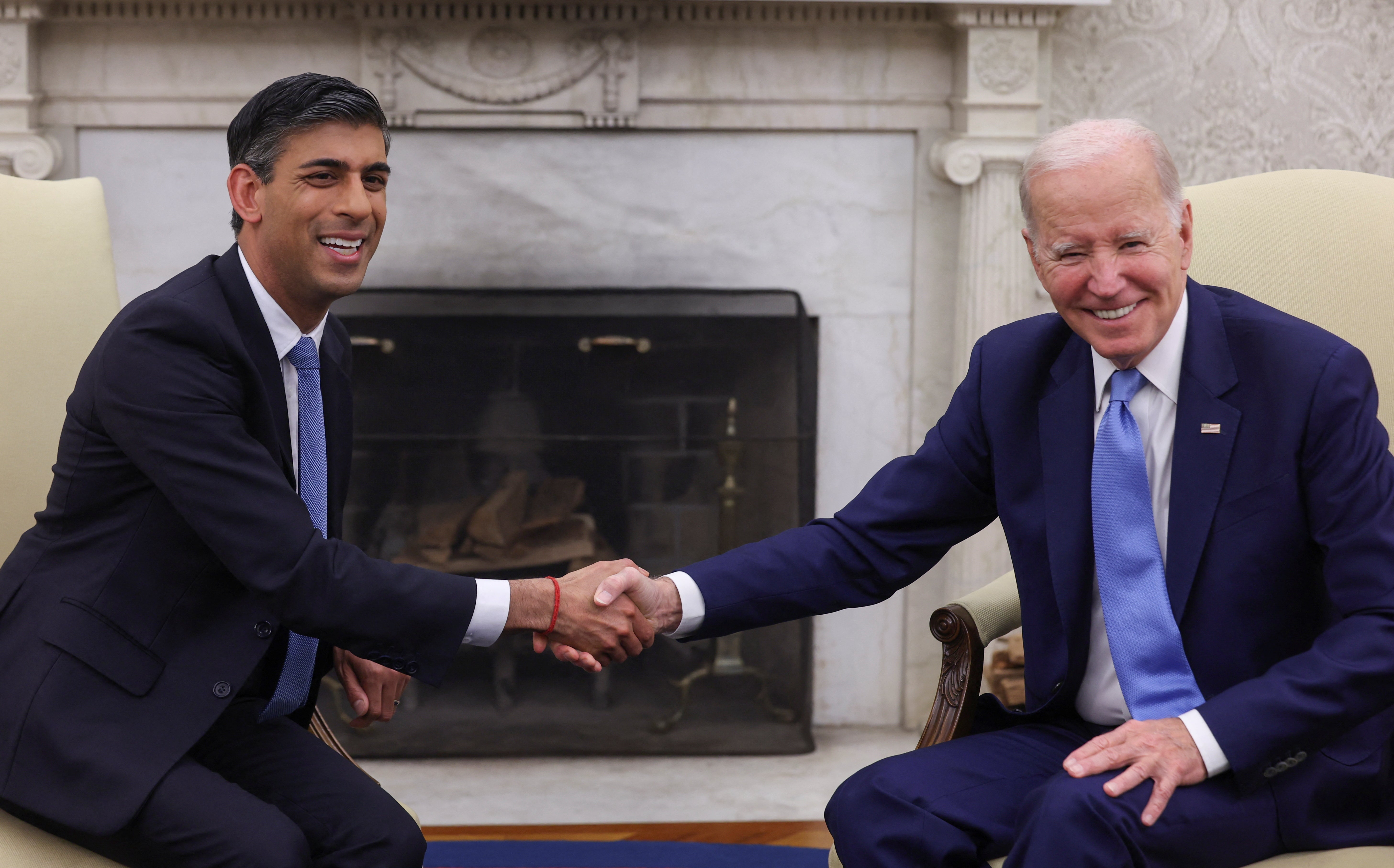Dishy Rishi’s pearly white teeth are a sign of the times
As his daughter gets a brace, Will Gore wonders whether he’s missed his chance of a perfect smile


The so-called “special relationship” between the UK and the United States is a product of our shared language, cultural ties and the bonds of history. It sure as hell ain’t about teeth. Where American mouths are full of pearly whites, the perception of us Brits is that our teeth are barely serviceable for eating, let alone flashing the kind of debonair smile that is de rigueur in New York or LA.
However, when Rishi Sunak and Joe Biden met this week at the White House, there was nothing to choose between their perfect gnashers. Sure, Biden’s may not be entirely his own, but it was still a lesson in what the special relationship can do: for us, a 1990s diet of perfect US teeth on TV dramas and sitcoms inspired us to sort out our mouths; for America, there is no longer the horror of hosting a PM who looks like they’ve either been chugging full-fat Coca-Cola for 30 years or been punched in the gob.
In other circumstances, I might not have given any thought to the teeth of global leaders, but this week my daughter had a brace fitted and so orthodontics has been a dominant theme in our house over recent days. It had been a few months in the offing, and – as former brace-wearers ourselves – my wife and I had been surprised at how sanguine our daughter seemed to be about the prospect. When the appointed hour arrived, however, her experience was more or less as unpleasant as we’d expected. A few days in, to what is likely to be a two-year reality, our daughter has eaten many super-soft scotch pancakes, and cried a few tears, but is holding up pretty well.
Between a third and 45 per cent of children require some form of orthodontic treatment; around a quarter of a million braces are fitted each year in the UK. While the NHS will now only treat without charge cases involving gaps of particular sizes, or teeth of particular degrees of crookedness, there appears to be no decline in the number of kids walking around with a mouthful of metal (or invisible Invisalign for those who can afford to splash the cash). My daughter can at least find solidarity among her classmates.
Thirty years ago, things were somewhat different. It was hardly unheard of for people to have braces, but they were fewer and further between than they are today, and with a wider range of types. Now, almost everyone seems to have a fixed brace, each tooth dotted with a square bracket. The one I had, fitted in the autumn of 1991, was of the removable variety – a series of wires set into a chunky plate that sat behind my lower front teeth. It was more like the kind of thing a rugby player wears in a scrum.
My dentist back then was a smoker, and would pop out for a fag between patients, after which he would desperately chew gum in an effort to avoid the worst of his tobacco breath permeating the treatment room. He’d extracted a tooth for me a few months before the brace was fitted – a procedure for which I’d unwisely worn a white T-shirt, and from which I departed looking like an extra from Die Hard and stinking of cigarettes.
The brace was initially ill-fitting, the plate cutting excruciatingly into my lingual frenulum. Even when that problem was resolved, the contraption was painful and left me with what I perceived to be a pronounced lisp. But at least I could take it out when eating, or sleeping, or playing sport, or indeed at any time it got on my nerves. No wonder my teeth never got fully straightened out.
While it’s hardly unusual to see adults wearing braces these days, I’m not planning to join their ranks. In fact, I now try to avoid the dentist as much as possible, frightened that I’ll be press-ganged into having another go at getting my pegs aligned.
My daughter might be stuck with her brace, and the aching mouth that wearing it entails, but at least she should have a perfect set of ivories by the time she’s in her mid-teens. When she’s PM, she can smile for the camera just like Sunak. As for me, I’ll just have to take the route some say Biden has gone down – hooray for dentures!
Join our commenting forum
Join thought-provoking conversations, follow other Independent readers and see their replies
Comments
Bookmark popover
Removed from bookmarks